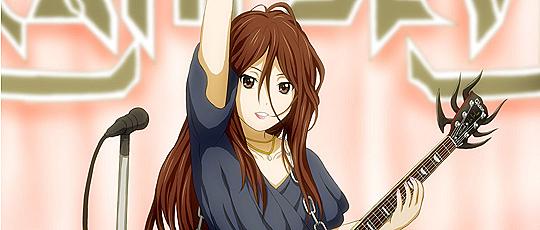The most innocuous of episodes and off-the-cuff remarks can lead to the most fascinating of rabbit holes. In this case, Sawako of K-On!! and why despite all of her obvious positive attributes, is unable to find a boyfriend and get married. It would seem she has everything going for her: looks, demeanour, intelligence and drive but it's only when scratching beneath the surface that it becomes apparent how much is aligned against her happiness.
The obvious remarks on this: she's fictional and the chances of finding a compatible partner are always slim. The former means that her status of being single is part of the character written for her, however as with other elements in anime, it is reflective of deeper social issues.
The worrisome treatment of women in modern Japan, which although legislatively in-line with other progressive countries, is still prevalent and the ingrained views are brutally difficult to overcome and presents the biggest challenge to successful women. This is odd when Japanese history saw women revered having been believed to be part deity - Amerterasu was after all female; even in work women could be seen alongside men working the fields. It was the introduction of Confucianism to Japan though that caused a sea change in gender views, promoting patriarchy and advocating women as second class to the gentlemen.
The minutiae and scope of this in Confucianism is debatable but the critical point is that womens' rights never happened in Japan. This means that many men grow up with their vision of an ideal women as subservient and family-orientated - think Aoi from Ai Yori Aoshi, not ones who have their own careers or are independent or forthright - in other words Catherine, or Sawako. The 1950's an 60's era situation where women were all but required to marry a man to survive has ebbed away but the thinking, at least from the male point of view, remains. Part of this could stem from the arranged marriages which up until the 1980's still accounted for almost a third of marriages, or the company sponsored matchmaking events for their junior male members - both depriving generations of the necessity of courting.
As well as contending with a current flowing against her gender, Sawako also faces the difficulty of finding the time to court or be courted by a man. Her job as a teacher likely affords her little time for socialising despite what K-On!! may purport - as well as teaching there are after school clubs to supervise, lesson plans to draw up, faculty meetings to attend - the list goes on. This is without taking into account the male workforce which is commonly seen as the salaryman: their long hours of work, meetings and late night drinking well documented. The outcome then is a working environment which actively discourages cross-discipline intermingling and finding the time to vet and date a prospective partner is challenging to say the least.
Not only does Sawako have both sexism and her career working against her, the statistics don't bode well either. 34% of unmarried men between the age of twenty five and thirty four say that they don't feel the "need" to get married while 44% of unmarried men and over 50% of unmarried women say that they haven't found the right partner. Meanwhile the largest category of unmarried males haven't completed education beyond the junior high school level. Contrast this with Sawako's job which implies she is university educated and the statistic that in the Tokyo metro area alone, 12% of female university graduates over the age of fifty have never been married.
Cutting through this scattershot of statistics and numbers and taking into account the previous oncerns, to call the singles market in Japan anything other than hostile for a successful, intelligent, strong-minded woman with a riotous past would be an understatement. Finding someone who is able to match her intellectually and not enforce archaic ideals upon her will be challenging if she can even find the time to begin such a search. Ironically the past she desperately hides would likely offer her more opportunities to find a partner and worse still, marriage comes with all manner of byzantine laws and social mores that are sure to strip her of her eclectic personality.
A lament then, for Catherine, for Sawa-chan.



As far as the low birth rate is concerned, that's a very complex topic that takes in aspects such as sexual norms in Japan, social structures and all sorts of crazy things. Workplace dedication is one area but feeds into a larger issue of family construction and government intervention.
-
@kadian1364: It's an odd situation as though it's a surefire way to be miserable, many Japanese have been brought up to believe that working hard and "enduring" is the way to succeed, and that if anyone doesn't do all the extra work, the drinking socials and whatnot, they get ostracised and don't "succeed". A truly mad system but unfortunately one without a clear solution, recently a lot more Japanese have been "waking up" to the fact that this ethic isn't cutting it any more, especially with western approaches to work infiltrating.
-
@Canne: The actual marriage issue is becoming increasingly distasteful in Japan for women as there are old rules existing that essentially makes them housekeepers for their husband's family. This combined with the financial problems of dependency allowances and social stereotyping, e.g. putting female workers on the "mommy track" and the environment is just so hostile for certain groups of women. Individual happiness is important but also not to take it too far which is what has happened with groups such as the parasite singles who stay at with their parents and live a hedonistic lifestyle. Balance and all that.